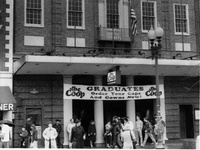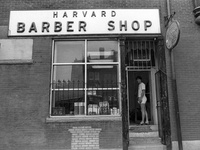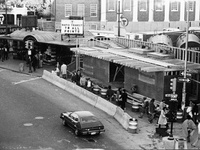Both Wolf and Jillson added that they have noticed an encouraging increase in women-owned independent businesses that are much more in the vein of the Square in the 80s.
“[They’re] going back a little bit to the idea that at least some things in Harvard Square ought to be unique to Harvard Square,” Wolf said.
THE PLIGHT OF SMALL BUSINESSES
Despite these statistics, several businesses in the Square, as well as long-term Cambridge residents, have noted a continuing transformation from unique shops to a higher prevalence of national chain stores and banks.
Paul J. MacDonald, current owner of the 126-year-old tobacco shop Leavitt and Peirce, said he believes that real estate in the Square has been increasingly leased out to tenants who can pay the highest rent, rather than to those who are appropriate for the Square.
“We end up being like an outdoor mall,” he said. “This is what’s wrong with Harvard Square.”
Wolf, whose district includes much of Western Cambridge, has lived in Cambridge for over 55 years and attested to the noticeable change in storefronts away from small businesses.
“Harvard Square had very unique businesses, they had the Design/Research [store] or many different bookstores, those kinds of things,” she said. “And then came the era of many chain stores, which we still have.”
MacDonald and Bartley claim that while Harvard Square previously catered to the local resident population, recently the allocation of real estate seemed to target the needs of Harvard University affiliates instead.
“What do they want? Fast food, cell phone stores, and plenty of banks,” MacDonald said.
But Bartley argues that from what he has seen changing in his Square neighborhood, the burgeoning of national chains in the Square is not as economically viable as one might assume.
“What we’ve seen time and time again is [banks] lease [buildings] to large national companies, and [the companies] don’t make money,” he said. “People know what they want when they come to Harvard Square, and I think what was there in 1985 is more what people want.”
Bartley and MacDonald both said they empathize with small business owners who are being squeezed out of the Square, but added that the Square is still a desirable place to visit.
“When you’re talking to someone who owns a business, it’s a shocking destination, it’s sort of lost its cache,” MacDonald said. “But as a tourist destination, it’s beautiful and it’s unique.”
“I might not be crazy about what’s in the buildings, but Harvard Square is really unique,” he added.
—Staff writer H. Zane B. Wruble can be reached at wruble@fas.harvard.edu.











